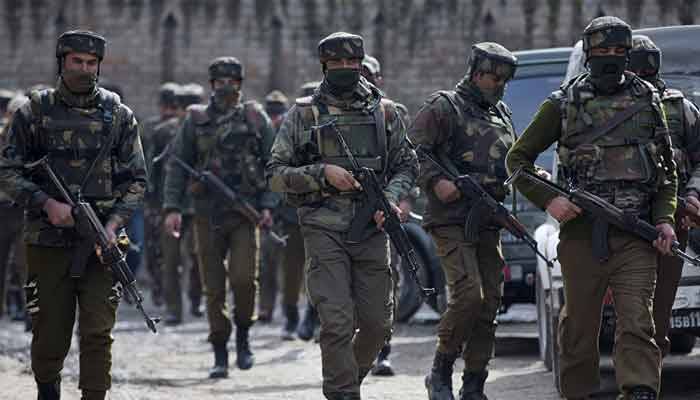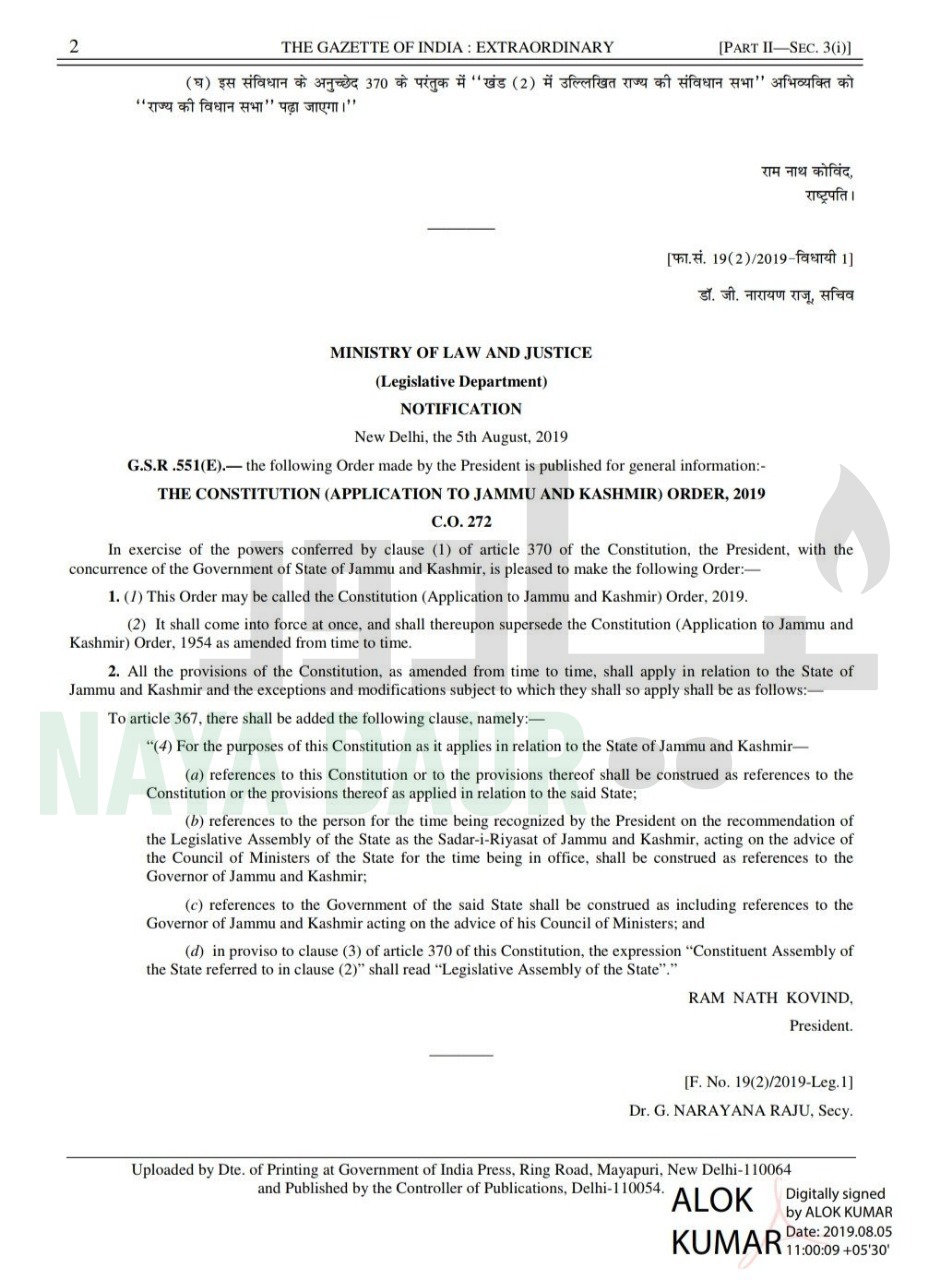
As Prime Minister Narendra Modi got a licence to move ahead with its promises after winning the general elections, India abolished on Monday the special status of Occupied Kashmir in the Indian constitution through a presidential decree.
The Indian government rushed through decree to scrap the special status of Occupied Kashmir, hours after imposing a major security clampdown in the region, as the president abolished Article 370 of the constitution that gave special autonomy to the region.
The order to scrap Article 370 in Jammu and Kashmir 'shall come into force at once', said Amit Shah.
After he proposed that the regulation under Article 370 will not be applicable after presidential nod, the Rajya Sabha witnessed massive uproar with the opposition slamming the Centre over the move.
Meanwhile, the Occupied Kashmir has been bifurcated.
A statement issued by the home minister said that "Jammu and Kashmir will be a union territory with legislature while Ladakh will be a union territory without legislature".
Article 370 specifies that except for Defence, Foreign Affairs, Communications and ancillary matters (matters specified in the Instrument of Accession), the Indian Parliament needs the state government's concurrence for applying all other laws. Thus, the state's residents lived under a separate set of laws, including those related to citizenship, ownership of property, and fundamental rights, as compared to other Indians."
Meanwhile, prominent Kashmiri politicians have been placed under house arrest, while communications to the region are also cut off. Phone and internet services are reportedly down in the region, where public gatherings have been banned and schools closed.
"As per the order there shall be no movement of public and all educational institutions shall also remain closed," a statement by the state government, which is currently under the central rule, said on Sunday night.
The order said the indefinite security restrictions will be applicable in the main district of Srinagar.
Last week authorities also ordered tourists and Hindu pilgrims to leave, citing a "terror threat" against an annual pilgrimage to a major shrine.
In the early hours of Monday, several political leaders said they had been placed under house arrest, former chief minister Mehbooba Mufti and Sajjad Lone, chairman of People’s Conference.
On Sunday evening, Omar Abdullah, the scion of a prominent political family in Kashmir, and former chief minister in the state, said he believed he would be placed under house arrest. Other “mainstream leaders” – meaning Kashmiri politicians who have formed alliances with parties such as the BJP – would be detained, he added.
The Kashmiri political leaders on Sunday, where they vowed to protect Kashmir’s special status, and warned against an escalation of tensions between Pakistan and India.
National Conference president Farooq Abdullah, reading out a resolution adopted at a meeting of regional parties, said they have decided to send delegations to meet the president, the prime minister and leaders of various political parties to apprise them of the consequences of any attempt to abrogate Article 370 and Article 35A of the constitution or carry out delimitation of constituencies or trifurcating the state.
The Indian government rushed through decree to scrap the special status of Occupied Kashmir, hours after imposing a major security clampdown in the region, as the president abolished Article 370 of the constitution that gave special autonomy to the region.
 Later, India’s Home Minister Amit Shah introduced a measure in Rajya Sabha to revoke the special constitutional status of Occupied Kashmir.
Later, India’s Home Minister Amit Shah introduced a measure in Rajya Sabha to revoke the special constitutional status of Occupied Kashmir.
The order to scrap Article 370 in Jammu and Kashmir 'shall come into force at once', said Amit Shah.
After he proposed that the regulation under Article 370 will not be applicable after presidential nod, the Rajya Sabha witnessed massive uproar with the opposition slamming the Centre over the move.
Also read: Better Chances Of Peace Talks If Modi Wins Again: PM Khan
Meanwhile, the Occupied Kashmir has been bifurcated.
A statement issued by the home minister said that "Jammu and Kashmir will be a union territory with legislature while Ladakh will be a union territory without legislature".
Article 370 specifies that except for Defence, Foreign Affairs, Communications and ancillary matters (matters specified in the Instrument of Accession), the Indian Parliament needs the state government's concurrence for applying all other laws. Thus, the state's residents lived under a separate set of laws, including those related to citizenship, ownership of property, and fundamental rights, as compared to other Indians."
Meanwhile, prominent Kashmiri politicians have been placed under house arrest, while communications to the region are also cut off. Phone and internet services are reportedly down in the region, where public gatherings have been banned and schools closed.
"As per the order there shall be no movement of public and all educational institutions shall also remain closed," a statement by the state government, which is currently under the central rule, said on Sunday night.
The order said the indefinite security restrictions will be applicable in the main district of Srinagar.
Last week authorities also ordered tourists and Hindu pilgrims to leave, citing a "terror threat" against an annual pilgrimage to a major shrine.
In the early hours of Monday, several political leaders said they had been placed under house arrest, former chief minister Mehbooba Mufti and Sajjad Lone, chairman of People’s Conference.
On Sunday evening, Omar Abdullah, the scion of a prominent political family in Kashmir, and former chief minister in the state, said he believed he would be placed under house arrest. Other “mainstream leaders” – meaning Kashmiri politicians who have formed alliances with parties such as the BJP – would be detained, he added.
The Kashmiri political leaders on Sunday, where they vowed to protect Kashmir’s special status, and warned against an escalation of tensions between Pakistan and India.
National Conference president Farooq Abdullah, reading out a resolution adopted at a meeting of regional parties, said they have decided to send delegations to meet the president, the prime minister and leaders of various political parties to apprise them of the consequences of any attempt to abrogate Article 370 and Article 35A of the constitution or carry out delimitation of constituencies or trifurcating the state.
